(See English version below.)
งานของเรา
ผู้หญิงกับความร้อน: เสียงจากคนทำงานและการหาทางออก
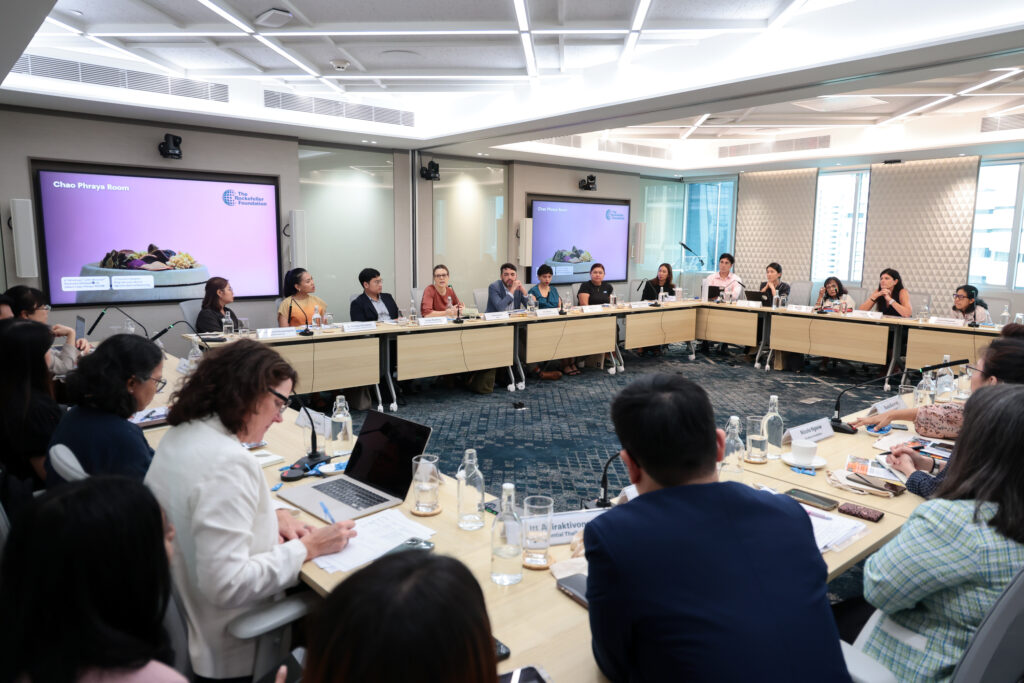
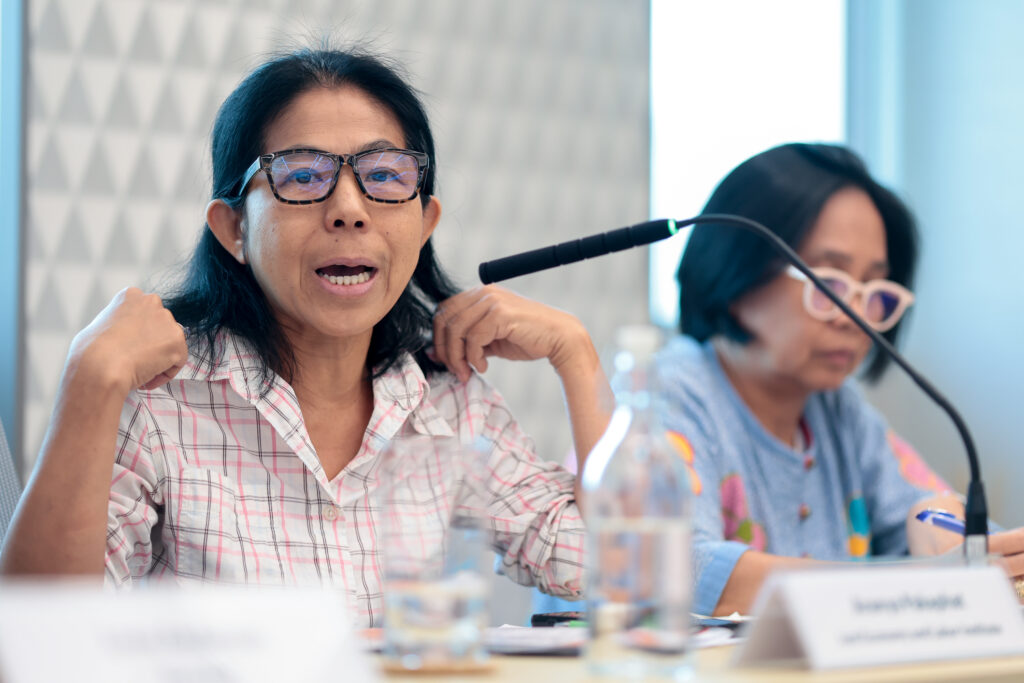
วันที่ 1 ตุลาคม 2568 JELI เข้าร่วมเวทีสนทนา “Women on the Frontlines of Heat – Stories and Solutions from Thailand” ซึ่งจัดขึ้นโดย Climate Resilience for All ร่วมกับ Prudence Foundation เป็นกิจกรรมส่วนหนึ่งของ Bangkok Climate Action Week ที่จัดขึ้นในกรุงเทพฯ ตลอดช่วงเดือนกันยายนและตุลาคม 2568
โดย JELI ได้ร่วมบอกเล่าข้อค้นพบจากการสำรวจผลกระทบจากความร้อนสูง (Extreme Heat) ที่มีต่อคนงานหญิงผ่านการทำวงสนทนากลุ่มเชิงลึกร่วมกับคนงานหญิงในภาคเกษตรกรรม ก่อสร้าง และขนส่งคน/อาหาร กว่า 100 คน ซึ่งนอกจากผลกระทบต่อสุขภาพกายและจิตใจที่ชัดเจนแล้ว ความร้อนส่งผลกระทบต่อการประกอบอาชีพ ทำให้รายได้ลดลงอย่างมีนัยสำคัญ ในขณะที่ค่าใช้จ่ายเพิ่มสูงขึ้น ผลที่ตามมาคือคนงานหญิงเหล่านี้ต้องเผชิญกับการใช้ชีวิตที่เปราะบางและไม่มีความมั่นคง เวทีสนทนานี้รวบรวมองค์กรที่มีความเชี่ยวชาญในหลากหลายด้านไม่ว่าจะเป็นการเงิน การจัดการความเสี่ยงทางด้านภัยพิบัติ การศึกษาวิจัย ฯลฯ มาร่วมแชร์แนวคิดในการหาทางออกและแนวทางแก้ไขเพื่อพัฒนาคุณภาพชีวิตคนงานหญิง ซึ่งทุกฝ่ายเห็นตรงกันว่าเป็นเรื่องที่สำคัญและมีความจำเป็นอย่างยิ่ง
วันงานที่มีคุณค่าสากล 2025
“ยกเลิกการจ้างงานที่ไม่มั่นคง หยุดละเมิดสิทธิแรงงาน”
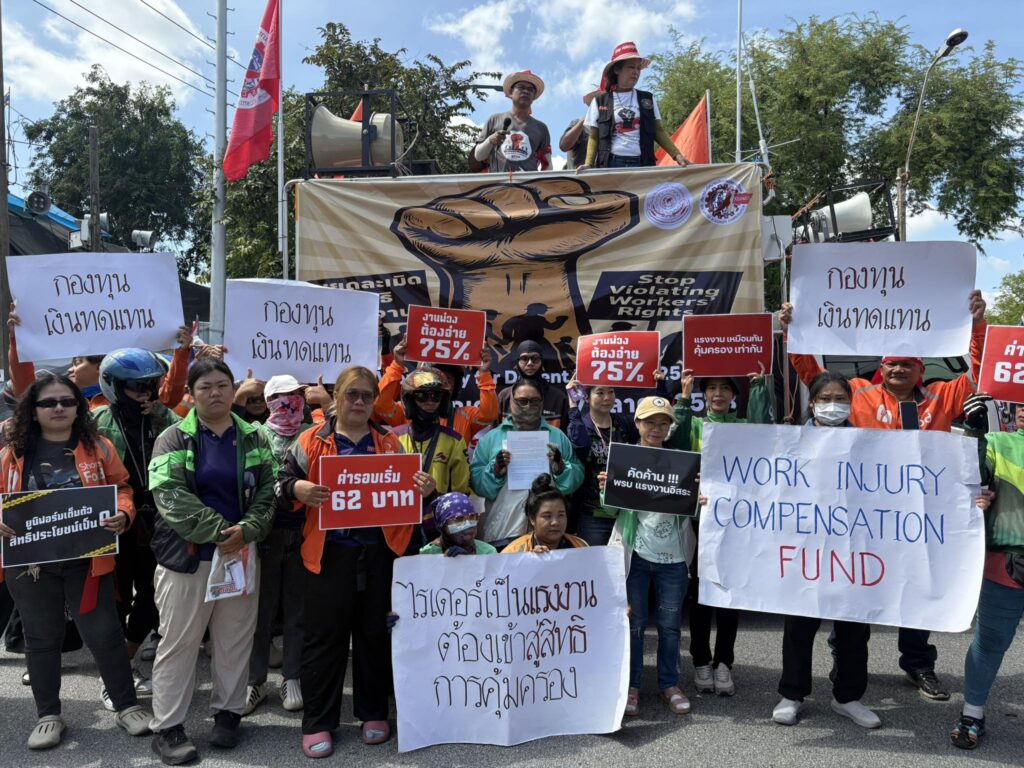
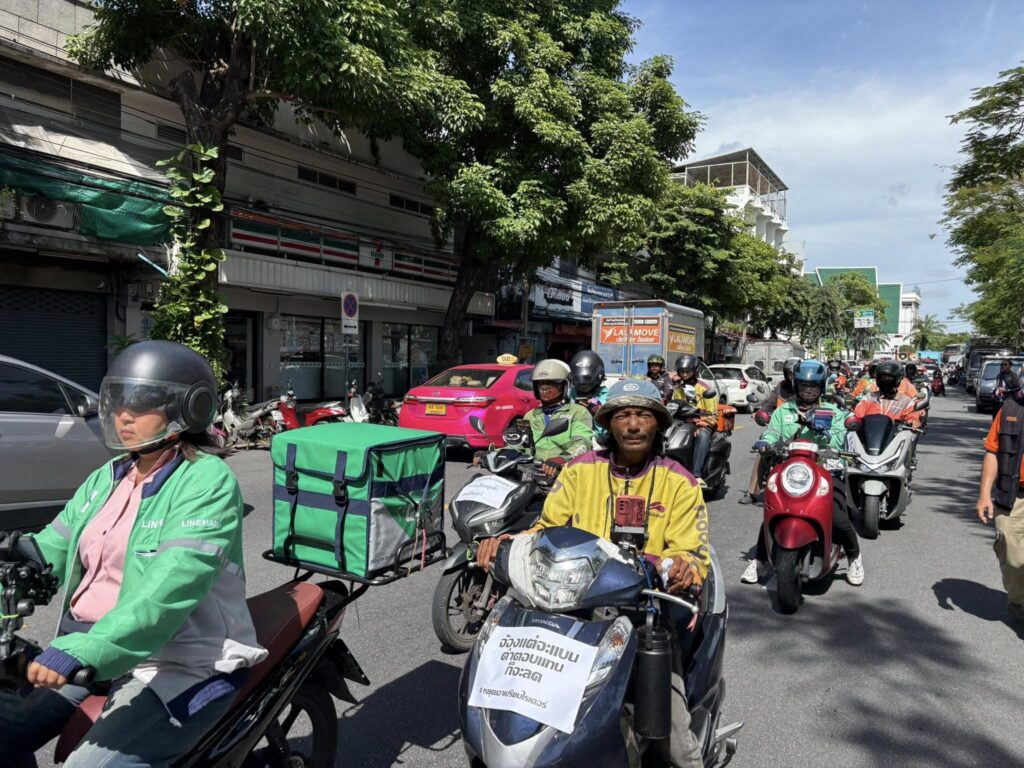
“งานที่มีคุณค่า คือ งานที่คำนึงถึงความเป็นมนุษย์ของคนทำงาน”
วันที่ 7 ตุลาคมของทุกปี ถือเป็นวัน “งานที่มีคุณค่าสากล” (World Day for Decent Work) ตามการประกาศขององค์การสหภาพแรงงานสากล (ITUC) ตั้งแต่ปี 2008 เป็นต้นมา
JELI พร้อมกับเครือข่ายไรเดอร์ สมาคมไรเดอร์ภาคใต้ Rider Center เข้าร่วมงาน World Day for Decent Work 2025 “ยกเลิกการจ้างงานที่ไม่มั่นคง หยุดละเมิดสิทธิแรงงาน” โดยความร่วมมือระหว่างสมาพันธ์สมานฉันท์แรงงานไทย สมาพันธ์แรงงานรัฐวิสาหกิจสัมพันธ์ และเครือข่ายแรงงาน เดินรณรงค์จากหน้าองค์การสหประชาชาติไปยังทำเนียบรัฐบาล เพื่อยื่นหนังสือเรียกร้องให้รัฐบาลรับรองสิทธิแรงงานขั้นพื้นฐาน ผลักดันให้ทุกคนมีงานที่มีคุณค่า (Decent Work) ตามแนวคิดขององค์การแรงงานระหว่างประเทศ (ILO) บนหลักการ ดังนี้
- งานที่นำมาซึ่งโอกาสในการทำงานและรายได้ที่เป็นธรรม
- งานที่ทำให้รู้สึกมั่นคงและปลอดภัยเมื่ออยู่ที่ทำงาน
- งานที่สามารถสร้างความมั่นคง-ความคุ้มครองทางสังคมให้กับครอบครัว
- งานที่ช่วยให้ได้พัฒนาตนเอง
- งานที่ช่วยให้ได้รับการยอมรับจากสังคมหรือเป็นส่วนหนึ่งของสังคม
- งานที่สนับสนุนการเข้ามามีส่วนร่วมตัดสินใจในเรื่องใดๆ ที่อาจจะกระทบกับชีวิตของผู้ที่ทำงาน
- งานที่ให้โอกาสและการปฏิบัติอย่างเท่าเทียมทางเพศ
เสียงจากแรงงานภาคเกษตรกรรมเพื่อกฎหมายและความคุ้มครองที่มีประสิทธิภาพ
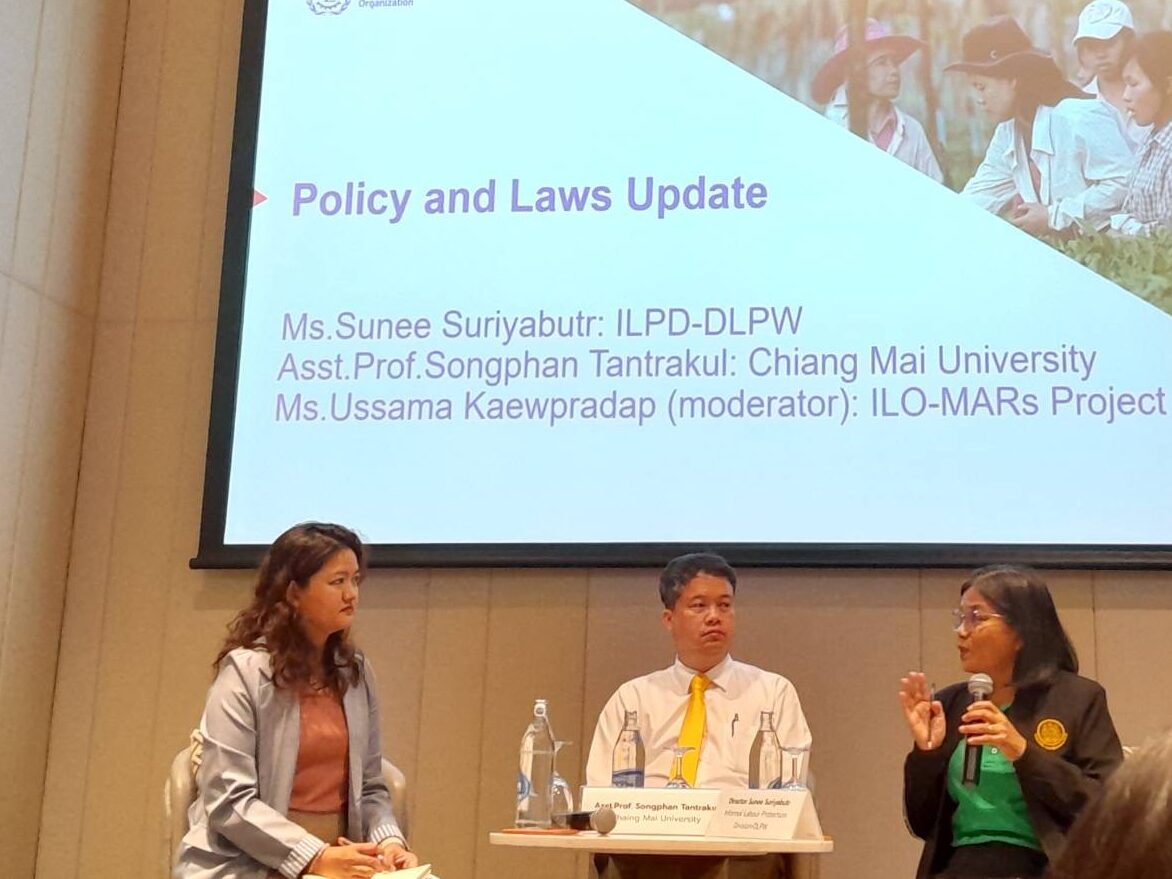
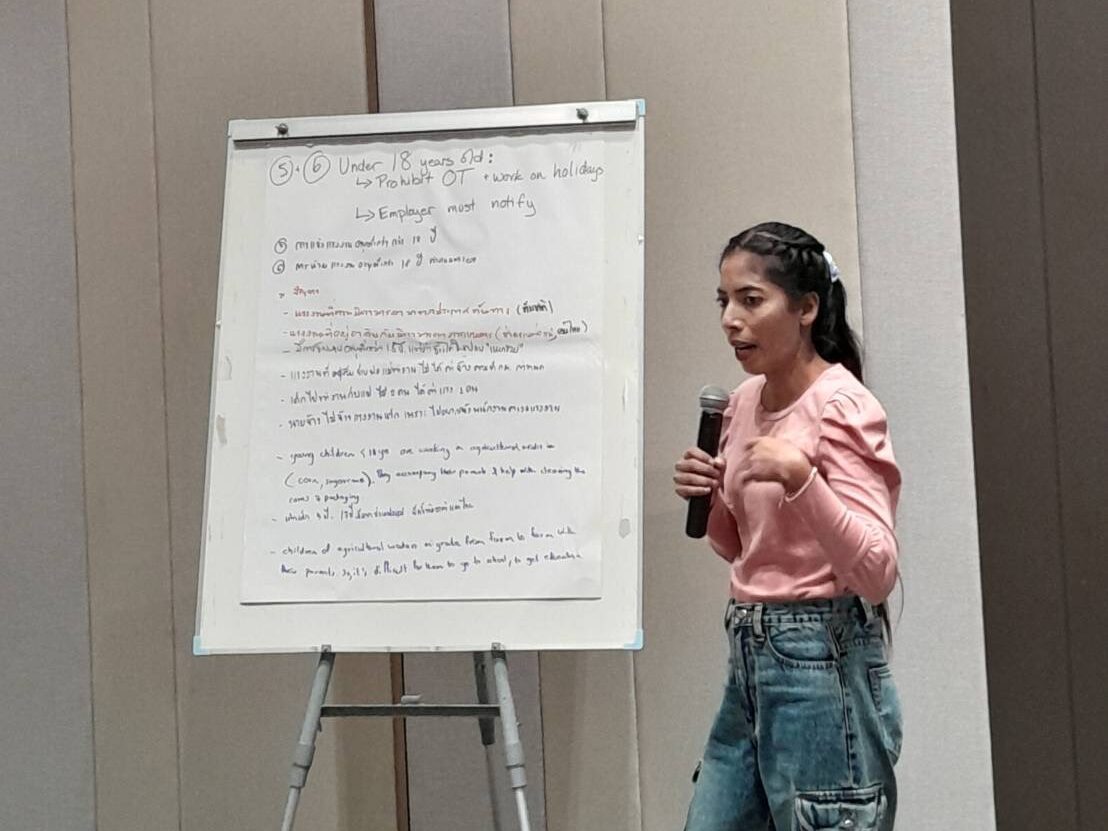
วันที่ 8 ตุลาคม 2568 JELI เข้าร่วมเวิร์กชอปซึ่งจัดขึ้นโดยองค์การแรงงานระหว่างประเทศ (ILO) เพื่อเสริมสร้างความสมานฉันท์เพื่อกฎหมายและความคุ้มครองแรงงานในภาคเกษตรกรรมอย่างมีประสิทธิภาพ โดยจัดขึ้นที่โรงแรมอวานี กรุงเทพมหานคร การประชุมในครั้งนี้มีตัวแทนคนงานจากหลากหลายพื้นที่ในประเทศไทยเข้าร่วม เช่น คนงานสวนผลไม้ในจังหวัดลำพูน คนงานผ่าหอยในจังหวัดสมุทรสงครามและตำบลมหาชัย จังหวัดสมุทรสาคร คนงานสวนยาง และอื่นๆ
ในเวิร์กชอปนี้ ผู้เข้าร่วมได้เล่าถึงสภาพการทำงานของคนงานแต่ละกลุ่ม และร่วมกันสร้างข้อเสนอแนะเพื่อให้เกิดการแก้ไขกฎกระทรวงคุ้มครองแรงงานในงานเกษตรกรรม ซึ่งขณะนี้กำลังอยู่ภายใต้การพิจารณา หนึ่งในข้อเสนอหลักซึ่งเสนอโดยคนงานคือ “ประเด็นค่าจ้าง” ซึ่งเห็นว่าควรมีการประกันค่าจ้างขั้นต่ำ (Minimum Wage) ให้กับคนงานที่ทำงานให้กับนายจ้างเป็นเวลา 8 ชั่วโมง นอกเหนือจากการรับงานแบบรายชิ้น (Piece Rates) และรายชั่วโมงสำหรับผลผลิตเฉพาะบางรายการ อีกทั้งเสนอให้ประเทศไทยมีระบบค่าจ้างขั้นต่ำอัตราเดียวทั่วประเทศ (National Minimum Wage System) เพื่อแทนที่ระบบเดิมที่ใช้อัตรารายจังหวัดแตกต่างกัน และจะต้องนำไปใช้กับคนงานโดยเท่าเทียมอย่างไม่แบ่งแยกเพศ อายุ และเชื้อชาติ
พ.ร.บ.ส่งเสริมและคุ้มครองแรงงานอิสระ คุ้มครองไรเดอร์จริงหรือ?
เวทีเสวนาของไรเดอร์เชียงใหม่
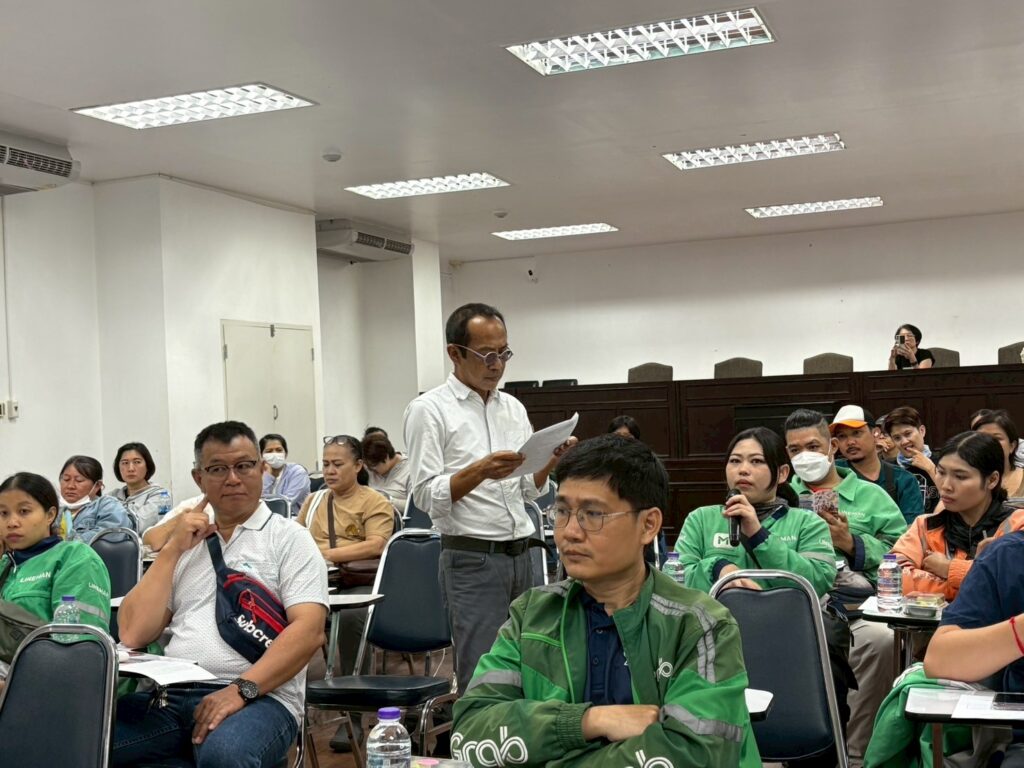
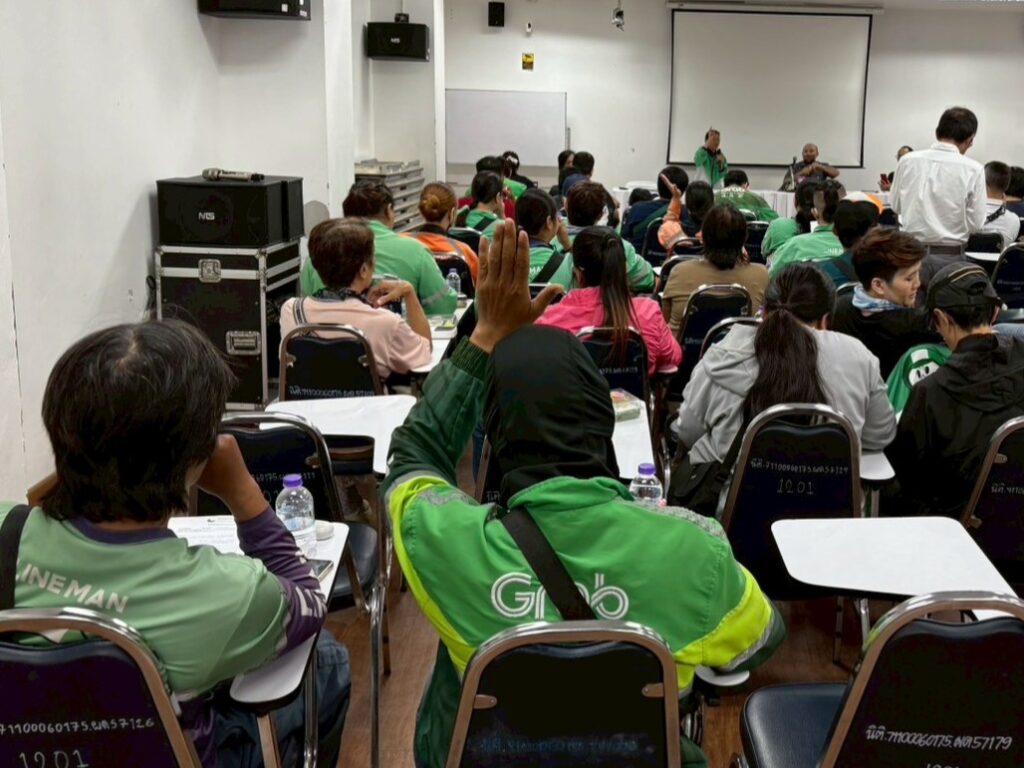
วันที่ 8 ตุลาคม 2568 JELI ร่วมกับคณะนิติศาสตร์ มหาวิทยาลัยเชียงใหม่ และสหภาพคนทำงาน จัดเสวนาในหัวข้อ “พ.ร.บ.ส่งเสริมและคุ้มครองแรงงานอิสระ คุ้มครองไรเดอร์จริงหรือ?” โดยมีไรเดอร์กว่า 40 คน จากหลายพื้นที่ในจังหวัดเชียงใหม่เข้าร่วมแสดงความคิดเห็น
ตลอดหลายเดือนที่ผ่านมา มีการผลักดันร่างกฎหมายฉบับนี้โดยกระทรวงแรงงาน ขณะที่ไรเดอร์แสดงความกังวลและคัดค้าน งานเสวนาจึงเป็นพื้นที่เพื่อขยายการรับรู้และฟังเสียงไรเดอร์ที่จะเป็นผู้ได้รับผลกระทบโดยตรงจากหลายพื้นที่ เช่น ไรเดอร์เชียงใหม่ซึ่งเช่นเดียวกับไรเดอร์ต่างจังหวัดที่ได้ค่ารอบต่างจากไรเดอร์ในกรุงเทพ ซึ่งจากการสอบถาม เริ่มต้นเพียง 20-24 บาทเท่านั้น และกรณีไรเดอร์ประสบอุบัติเหตุรุนแรงแต่ประกันจากแพลตฟอร์มกลับยุ่งยากซับซ้อน ไม่สามารถใช้งานได้จริง ทำให้ต้องใช้ประกันส่วนตัวแทน ซึ่งข้อเรียกร้องสำคัญตลอดหลายปีที่ผ่านมาของไรเดอร์ก็คือการเข้าถึงกองทุนเงินทดแทนเพื่อคุ้มครองในกรณีที่เกิดอุบัติเหตุเช่นนี้ขึ้นในระหว่างการทำงาน
พ.ร.บ. ส่งเสริมและคุ้มครองแรงงานอิสระ กระทบไรเดอร์อย่างไร?
กฎหมายคุ้มครองแรงงาน พ.ศ. 2541 ซึ่งเป็นกฎหมายหลักของไทย คุ้มครองลูกจ้างในหลายด้าน เช่น ค่าจ้างขั้นต่ำ ชั่วโมงการทำงาน ความปลอดภัยในการทำงาน ประกันสังคม มาตรา 33 รวมถึงสิทธิในการรวมกลุ่มและเจรจาต่อรอง เมื่อหันกลับมามองลักษณะการทำงานของไรเดอร์ ก็พบว่ามีความสัมพันธ์แบบ “นายจ้าง-ลูกจ้าง” ชัดเจน เนื่องจากแพลตฟอร์มมีอำนาจสั่งการ ควบคุม และลงโทษได้ จึงเกิดคำถามตามมาว่า ไรเดอร์จะถือเป็น “แรงงานอิสระ” ได้อย่างไร?
ร่าง พ.ร.บ. แรงงานอิสระนี้ระบุถึงสิทธิประโยชน์ที่ยังไม่ชัดเจน ทั้งเรื่องกองทุนส่งเสริมและคุ้มครองแรงงานอิสระที่จะหักรายได้ 3% ของไรเดอร์เข้าไปสมทบ แต่ประโยชน์ที่จะได้รับยังต้องผ่านการพิจารณาจากคณะกรรมการฯ ซึ่งสัดส่วนที่นั่งยังเป็นคำถาม และเมื่อเปรียบเทียบกับสิทธิขั้นพื้นฐานในกฎหมายแรงงานเดิมแล้ว ไม่สามารถเทียบได้เลย ทั้งในเรื่องรายได้ขั้นต่ำ ความปลอดภัย สวัสดิการ และการรวมกลุ่มต่อรอง
นอกจากนี้ ยังพิจารณาถึงหลัก Fair Work ที่ถูกใช้เป็นมาตรฐานขั้นต่ำสำหรับแรงงานแพลตฟอร์ม ซึ่งประกอบด้วย
- ค่าตอบแทนที่เป็นธรรม รายได้ต้องครอบคลุมต้นทุนและเวลาทำงานจริง
- สภาพการทำงานที่เป็นธรรม มีมาตรการป้องกันความเสี่ยงและอุปกรณ์ที่จำเป็นให้กับไรเดอร์
- สัญญาที่เป็นธรรม เงื่อนไขต้องเปิดเผยและตรวจสอบได้ ไม่ให้แพลตฟอร์มเอาเปรียบ
- การบริหารจัดการที่เป็นธรรม ต้องมีกลไกที่จริงจัง ไม่ใช่ไรเดอร์ถูกปิดแอพหรือลงโทษฝ่ายเดียว
- การรวมกลุ่มที่เป็นธรรม ไรเดอร์ต้องมีสิทธิรวมตัวและต่อรองร่วมกัน
คำถามใหญ่ที่เกิดขึ้นคือ พ.ร.บ. แรงงานอิสระนี้จะ “คุ้มครอง” ไรเดอร์จริงหรือทำให้ไรเดอร์เสียสิทธิที่ควรได้รับในฐานะลูกจ้างกันแน่?
สุดท้าย ไรเดอร์ส่วนใหญ่ยังไม่รู้จักหรือเคยได้ยินเกี่ยวกับร่างกฎหมายนี้มาก่อน จึงเห็นว่าควรมีการเผยแพร่และสร้างความเข้าใจให้ทั่วถึง โดยเริ่มจากการถอดถอนร่าง พ.ร.บ. ฉบับนี้ออกมาเพื่อศึกษาและพิจารณาอย่างรอบด้าน ไม่ใช่เร่งผลักดันโดยไม่ฟังเสียงผู้ที่ได้รับผลกระทบจริง
เวทีภาคประชาชนไทย (Thailand Social Forum): “เพื่อโลกที่ดีกว่านี้!”
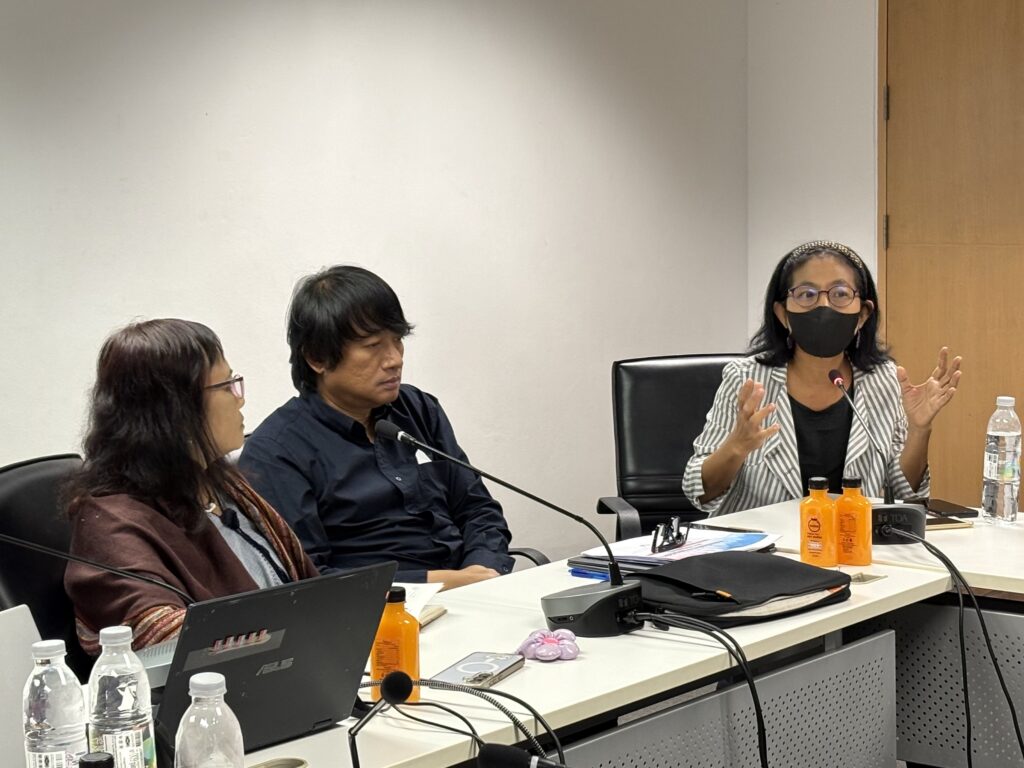
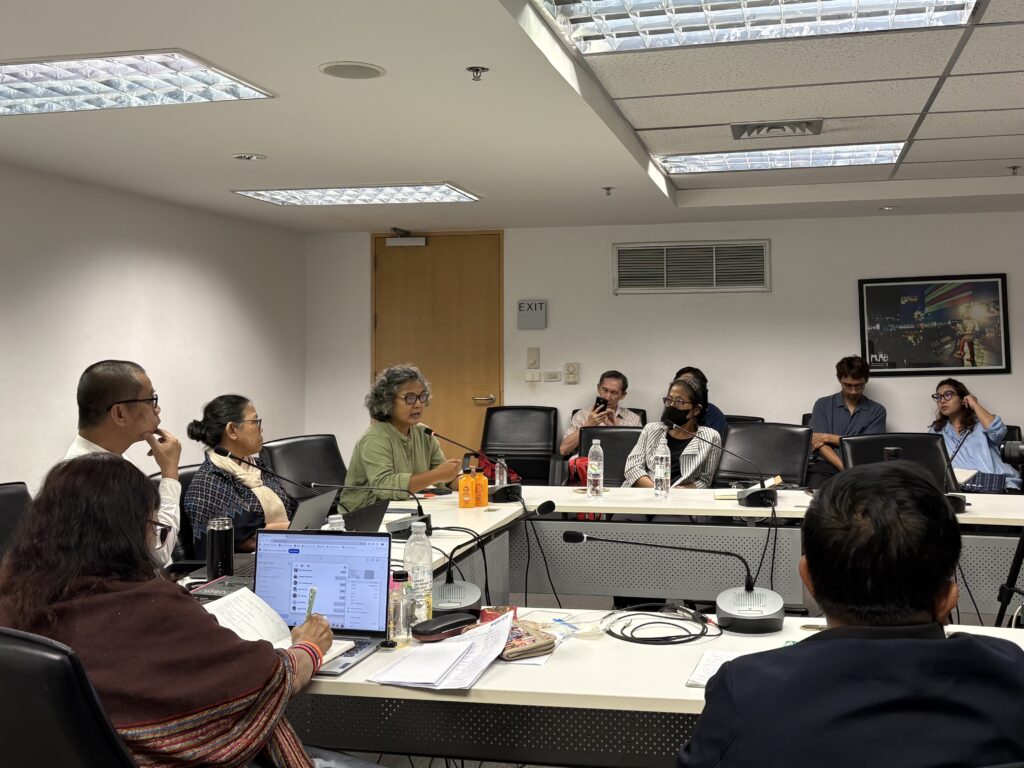
วันที่ 18 ตุลาคม 2568 JELI เข้าร่วมเวทีภาคประชาชนไทย (Thai Social Forum) ในหัวข้อ เพื่อโลกที่ดีกว่านี้! เพื่อเตรียมความพร้อมสำหรับงาน Asia Pacific Social Forum 2025 ที่จะจัดขึ้นในวันที่ 1-5 พฤศจิกายน 2568 ณ มหาวิทยาลัยธรรมศาสตร์ ท่าพระจันทร์ โดยอรัญญา ภคภัทร ผู้แทน JELI ได้ร่วมอภิปรายในเวที Finance & Climate Justice: การลงทุน การจ้างงานที่เปลี่ยนไป กับสิทธิแรงงานและหลักประกันทางสังคม ร่วมกับสาวิทย์ แก้วหวาน จากสมาพันธ์สมานฉันท์แรงงานไทย (สสรท.) และนิติรัตน์ ทรัพย์สมบูรณ์ จาก WeFair
อรัญญา ผู้แทน JELI ได้บอกเล่าเกี่ยวกับสถานการณ์การจ้างงานอุตสาหกรรมแพลตฟอร์มในปัจจุบันซึ่งไม่ใช่เรื่องใหม่อีกแล้วหลังจากเกิดการจ้างงานลักษณะนี้ในประเทศไทยมากว่า 10 ปี แต่แรงงานแพลตฟอร์มกลับยังไม่มีความมั่นคงในการจ้างงาน ไม่มีความคุ้มครองด้านแรงงานและสังคมจากรัฐหรือแม้กระทั่งบริษัทแพลตฟอร์ม แรงงานไทยโดยเฉพาะกลุ่มที่เพิ่งเข้าสู่ตลาดแรงงาน ทยอยเข้าสู่การจ้างงานแบบนี้เพิ่มมากขึ้น หลายคนยังอายุน้อย ทำงานแล้วประสบอุบัติเหตุ บาดเจ็บสาหัสไปจนถึงขั้นพิการหรือเสียชีวิต โดยที่ไม่มีหลักประกันหรือการชดเชยใดๆ โดยเฉพาะในอุตสาหกรรมขนส่งคน อาหาร สิ่งของ ที่ระบบที่กดค่าจ้างให้ต่ำ และใช้ระบบ Incentive ให้คนต้องโหมทำงานอย่างหนักทั้งๆ ที่ไม่มีความคุ้มครองอะไรให้ เช่น ไรเดอร์ที่ต้องเสี่ยงตายทำงานท่ามกลางฝนตกหนักเพื่อให้ได้ Incentive เพิ่มเพียงเล็กน้อย แต่หากประสบเหตุใดขึ้นมากลับต้องรับผิดชอบชีวิตตนเองโดยไม่มีความคุ้มครองจากบริษัท จึงเป็นประเด็นที่ภาคประชาชนเห็นร่วมกันว่าถึงเวลาแล้วที่จะต้องเกิดการเปลี่ยนแปลง และเรียกร้องการตอบสนองจากทั้งภาคธุรกิจและภาครัฐ
การติดตามข้อเสนอแนะของคณะกรรมการสิทธิมนุษยชนแห่งชาติ
เพื่อคุ้มครองสิทธิแรงงานในระบบแพลตฟอร์มดิจิทัล
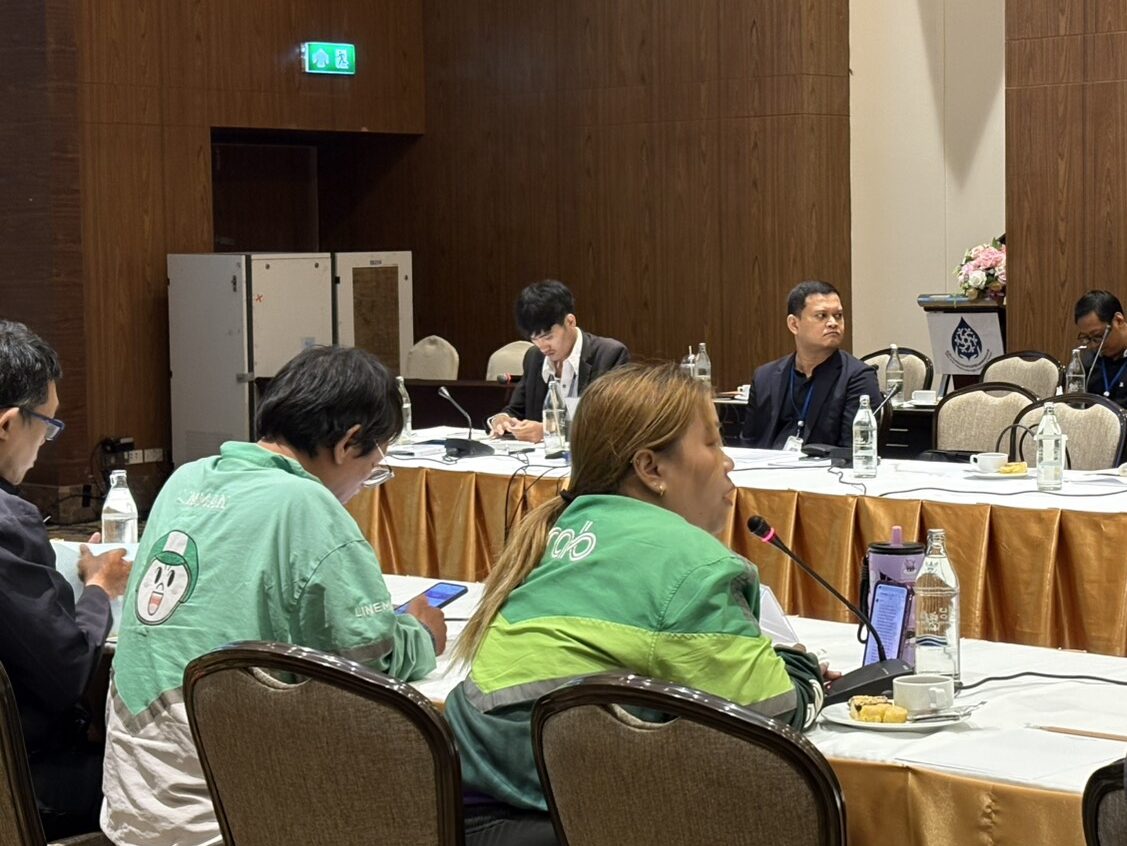
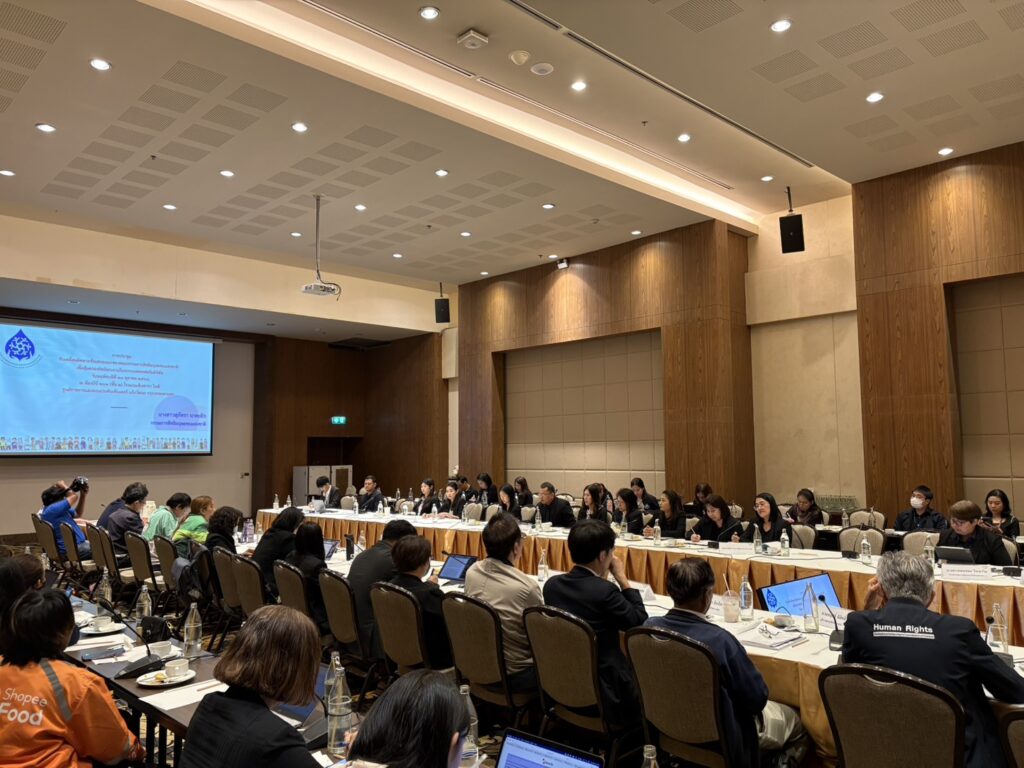
เมื่อวันที่ 30 ตุลาคม 2568 JELI พร้อมกับเครือข่ายคนทำงานแพลตฟอร์ม ไรเดอร์ หมอนวด คนทำงานดูแล และสหภาพคนทำงาน เข้าร่วมการประชุมติดตามข้อเสนอแนะของคณะกรรมการสิทธิมนุษยชนแห่งชาติเพื่อคุ้มครองสิทธิแรงงานในระบบแพลตฟอร์มดิจิทัล โดยมีผู้เข้าร่วมจากภาคส่วนที่เกี่ยวข้อง ได้แก่ ผู้แทนบริษัทโบลท์ ซัพพอร์ต เซอร์วิสเซส (ประเทศไทย) จำกัด กรมสวัสดิการและคุ้มครองแรงงาน กระทรวงแรงงาน สำนักงานประกันสังคม สำนักงานคณะกรรมการกฤษฎีกา สำนักงานพัฒนาธุรกรรมทางอิเล็กทรอนิกส์ สมาพันธ์สมานฉันท์แรงงานไทย และอื่นๆ
การประชุมครั้งนี้เป็นผลสืบเนื่องจากการยื่นข้อเรียกร้องและผลักดันให้เกิดการเจรจาทางสังคมโดยสหภาพคนทำงาน เครือข่ายไรเดอร์ และ JELI ทำให้เกิดการติดตามรายงานการตรวจสอบข้อเรียกร้องเกี่ยวกับไรเดอร์และแรงงานในระบบแพลตฟอร์ม โดยเป็นการประชุมเพื่อติดตามความคืบหน้าในกรณีผลการพิจารณาของ กสม. ว่าไรเดอร์ถือเป็น “ลูกจ้าง” ไม่ใช่ “พาร์ทเนอร์” ของบริษัท อย่างที่บริษัทกล่าวอ้างเพื่อเลี่ยงการคุ้มครองตามกฎหมายคุ้มครองแรงงาน ซึ่งเข้าข่ายละเมิดสิทธิมนุษยชน นอกจากนี้ กสม. ได้ส่งเรื่องข้อเสนอแนะต่อผู้ประกอบการแพลตฟอร์มดิจิทัลเพื่อส่งเสริมคุ้มครองสิทธิแรงงาน แต่ได้รับการปฏิเสธจากบริษัทแพลตฟอร์มซึ่งยังเห็นว่าการจ้างงานไรเดอร์เป็นลักษณะของการจ้างทำของและพาร์ทเนอร์ทางธุรกิจ ส่วนทางรัฐบาลที่ได้มีข้อเสนอแนะให้พิจารณาตามมาตรา 22 ของ พ.ร.บ. คุ้มครองแรงงาน พ.ศ. 2541 เพื่อคุ้มครองไรเดอร์ และให้มีการดำเนินการกำกับดูแลแพลตฟอร์มดิจิทัล ก็ยังไม่มีความคืบหน้าใดๆ อีกทั้งกระทรวงแรงงานยังเร่งผลักดันร่าง พ.ร.บ. ส่งเสริมและคุ้มครองแรงงานอิสระ ซึ่งจะนิยามไรเดอร์เป็น “แรงงานกึ่งอิสระ” แทน “ลูกจ้าง” อย่างที่ควรจะเป็นตามลักษณะงานจริงและอำนาจบังคับบัญชาของบริษัทแพลตฟอร์ม
ที่ประชุมได้เปิดพื้นที่ให้แต่ละองค์กรชี้แจงแนวทางการดำเนินการต่อเรื่องดังกล่าว และหาทางออกร่วมกันเพื่อให้เกิดการคุ้มครองแรงงานในระบบแพลตฟอร์มดิจิทัลโดยเร็ว โดยสรุปได้ว่า กสม. จะจัดทำรายงานเพื่อเสนอต่อ ครม. ในกรณีที่ผู้มีส่วนเกี่ยวข้องไม่มีการดำเนินการตามข้อเสนอแนะในรายงานการละเมิดสิทธิมนุษยชน และที่ประชุมได้หารือร่วมกันถึงแนวทางในการกำหนดกฎกระทรวงให้ไรเดอร์ได้รับการคุ้มครองตาม พ.ร.บ.คุ้มครองแรงงานฯ ในลักษณะเดียวกันกับกฎกระทรวงว่าด้วยการคุ้มครองแรงงานในงานที่รับไปทำที่บ้าน พ.ศ. 2547 และกฎกระทรวงคุ้มครองแรงงานในงานเกษตรกรรม พ.ศ. 2557 อาศัยตามมาตรา 6 ของ พ.ร.บ.คุ้มครองแรงงานฯ ให้อำนาจรัฐมนตรีว่าการกระทรวงแรงงานในการออกกฎกระทรวง ซึ่ง กสม. จะได้ดำเนินการเพื่อยื่นข้อเสนอแนะต่อ ครม. ต่อไป
ข่าวสำคัญ
“สมเด็จพระนางเจ้าสิริกิติ์ พระบรมราชินีนาถ พระบรมราชชนนีพันปีหลวง” สวรรคต สิริพระชนมพรรษาปีที่ 93 อ่านที่: ไทยรัฐ
ไทย-กัมพูชา ลงนามใน “ถ้อยแถลงร่วม” ที่มาเลเซีย ทรัมป์เป็นสักขีพยาน ยกเป็น “ข้อตกลงสันติภาพ” อ่านที่: BBC News
ครม.รับทราบลงนาม MOU “แร่แรร์เอิร์ธ” ไทย-สหรัฐฯ ยืนยัน แม้เปิดโอกาสลงทุน-สำรวจ แต่ยึดตามกฎหมายแร่ไทย ต้องเปิดประมูลอย่างเสรี ไม่ใช่ให้สหรัฐฯ โดยตรง อ่านที่: ThaiPBS
ร่างแก้ พ.ร.บ.คุ้มครองแรงงาน ลด ชม.ทำงาน-เพิ่มวันหยุด จ่อเข้าประชุมสภา วาระ 2-3 สมัยหน้า อ่านที่: ประชาไท
กิจกรรมที่จะมาถึง
Asia Pacific Social Forum (APSF) 2025
ขอเชิญเข้าร่วมเวทีระดับโลก Asia Pacific Social Forum (APSF) 2025 ซึ่งจะจัดขึ้นในวันที่ 1-5 พฤศจิกายน 2025
ณ มหาวิทยาลัยธรรมศาสตร์ ท่าพระจันทร์
โดย JELI จะเป็นผู้ร่วมจัดเวทีหารือในประเด็น Climate Justice ระหว่างวันที่ 3-4 พฤศจิกายน 2025 🌿✊
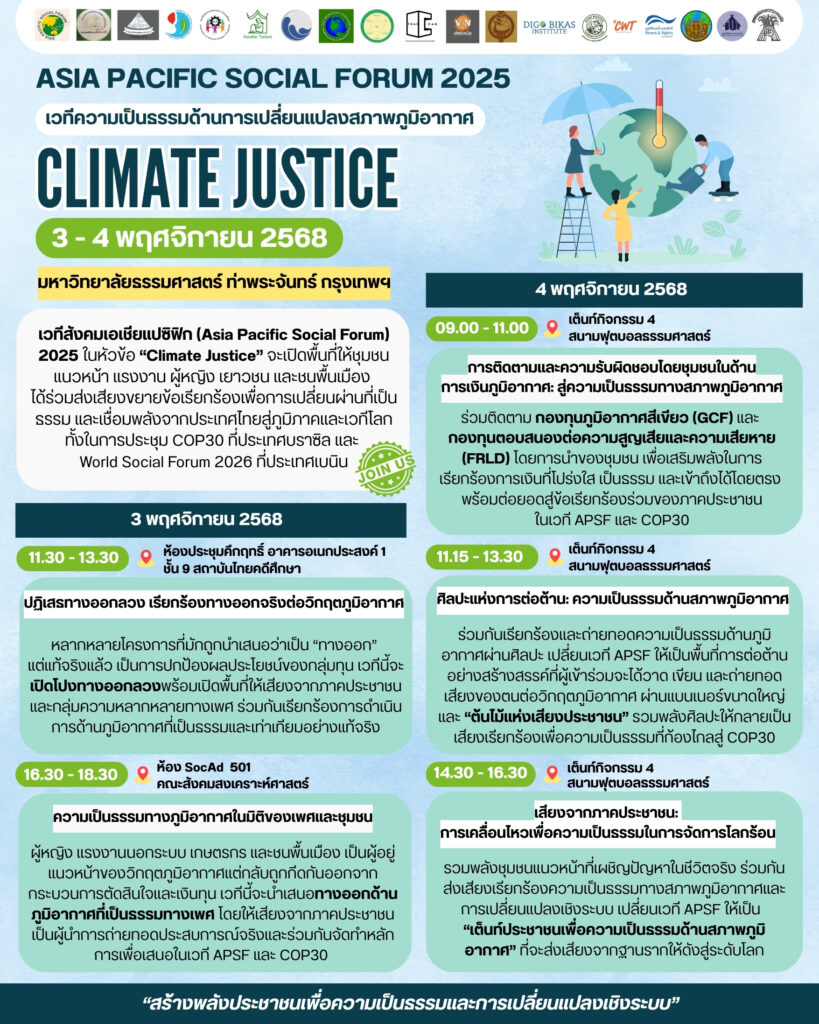
What Happened This Month
“Women on the Frontlines of Heat – Stories and Solutions from Thailand”


On October 1, 2025, JELI participated in the high-level roundtable “Women on the Frontlines of Heat – Stories and Solutions from Thailand,” organized by Climate Resilience for All in collaboration with the Prudence Foundation as part of Bangkok Climate Action Week, held throughout September and October 2025 in Bangkok.
JELI shared findings from the work on the impacts of extreme heat on women workers, gathered through a series of focus group discussions with more than 100 women in the agriculture, construction, and delivery sectors. The findings reveal not only clear effects on physical and mental health but also significant disruptions to livelihoods, reducing incomes while increasing expenses. As a result, many women workers are facing heightened vulnerability and instability in their daily lives.
The dialogue brought together organizations from various sectors, including finance, disaster risk management, and research, to exchange ideas and propose solutions for improving women workers’ quality of life, which is very urgent and essential.
World Day for Decent Work 2025
“Abolish Precarious Work, Stop Violating Workers’ Rights”


“Decent work means respecting the humanity of workers.”
Every year on October 7, workers around the world mark the World Day for Decent Work, first declared by the International Trade Union Confederation (ITUC) in 2008.
This year, JELI came together with the Southern Rider Association, Rider Center, and rider networks in the World Day for Decent Work 2025 under the theme “Abolish Precarious Work, Stop Violating Workers’ Rights.”
Led by the Thai Labour Solidarity Federation, the State Enterprises Workers’ Relation Confederation, and worker networks, we marched from the United Nations building to Government House. There, we called on the government to guarantee fundamental labour rights and ensure that everyone has access to decent work, as defined by the International Labour Organization (ILO).
According to the ILO, decent work is built on these principles:
- Fair opportunities for work and income
- Safety and security in the workplace
- Social protection for workers and their families
- Opportunities for personal development
- Recognition and inclusion in society
- Freedom of expression to raise concerns
- Participation in decisions affecting workers’ lives
- Equality and fairness regardless of gender
Agricultural Workers Call for Fair Wages and Labor Regulation Reform


On October 8, 2025, the International Labour Organization (ILO) conducted a workshop for building solidarity for effective laws and protection for workers in agriculture at the Avani Hotel in Bangkok. Worker representatives from across Thailand participated in the meeting, including those from fruit orchards in Lamphun, shellfish farms in Samut Songkhram and Mahachai, and rubber plantations.
The workshop participants discussed the working conditions of agricultural workers and proposed recommendations for improving the Labour Ministerial Regulation for Agricultural Workers, which is currently under review. One of the recommendations proposed by the worker representatives concerns wages: that the minimum wage should be guaranteed for workers working eight hours for an employer, in addition to piece rates for specific types of crops and an hourly wage. They also proposed that a national minimum wage system should be introduced in Thailand to replace provincial wage rates. Moreover, the same wage standards should apply to workers regardless of gender, age, and ethnicity.
Is the “Independent Workers Promotion and Protection Bill”
really protecting riders?


On October 8, 2025, the Just Economy and Labour Institute (JELI), in collaboration with the Faculty of Law, Chiang Mai University, and the Workers’ Union, organized a public dialogue titled “Independent Workers Promotion and Protection Bill: Does it really protect riders?” Over 40 riders from various areas in Chiang Mai joined the discussion to share their views.
In recent months, the Ministry of Labour has been pushing this draft bill forward, while riders have voiced strong concerns and opposition. The dialogue served as a space to raise public awareness and hear directly from those most affected, riders from across Thailand. For instance, riders in Chiang Mai and other provinces earn lower delivery rates than those in Bangkok, starting from only 20-24 baht per trip. Some riders who suffered severe work-related accidents also found that the insurance provided by platforms was complicated, limited, or unusable, forcing them to rely on their personal insurance instead.
For years, riders have been demanding access to the Workmen’s Compensation Fund to ensure proper protection and compensation in cases of accidents during work.
How does the Independent Workers Bill affect riders?
Thailand’s main Labour Protection Act (1998) guarantees a wide range of protections for employees, including minimum wage, working hours, occupational safety, social security (section 33), and the right to organize and collective bargaining.
Looking at riders’ working conditions, their relationship with platforms clearly reflects an employer-employee dynamic; platforms hold the power to assign, control, and penalize. This raises a key question: how can riders be considered “independent workers”?
The draft Independent Workers Bill outlines vague benefits. For example, it proposes a 3% contribution from riders’ income to a new “Promotion and Protection Fund,” yet the benefits they would receive remain unclear and are subject to approval by a committee whose composition is still in question. Compared with the existing rights under the Labour Protection Act, the draft offers much less in terms of income security, safety, welfare, and collective bargaining.
The discussion also referred to the Fair Work Principles, which serve as global minimum standards for platform workers, emphasizing that:
- Fair pay – income must cover actual costs and working time.
- Fair conditions – risk prevention and necessary equipment must be provided.
- Fair contracts – terms must be transparent and reviewable.
- Fair management – there must be due process; riders should not be penalized or deactivated unilaterally.
- Fair representation – riders must have the right to organize and bargain collectively.
The big question remains: will the Independent Workers Bill truly protect riders, or will it instead strip away the rights they should have as employees?
Finally, most riders admitted they had never heard of this bill before. They agreed that the government should disclose and communicate the draft widely, starting by withdrawing the bill for more thorough study and inclusive consultation, rather than rushing to pass it without listening to those directly affected.
Thailand Social Forum 2025: “For a Better World!”


On October 18, 2025, JELI participated in the Thai Social Forum under the theme “For a Better World!” – an event aimed at preparing for the upcoming Asia Pacific Social Forum (APSF) 2025, to be held from November 1-5, 2025, at Thammasat University, Tha Prachan Campus.
Aranya Pakaphat, representing JELI, joined the discussion panel titled “Finance & Climate Justice: Investment, Changing Employment, Workers’ Rights, and Social Protection” alongside Sawit Kaewwan from the Thai Labour Solidarity Federation and Nitirut Sapsomboon from WeFair.
Aranya shared insights on the current situation of platform employment in Thailand, which has existed for more than a decade but still lacks job security and legal or social protection from both the state and platform companies. Increasingly, Thai workers, especially young people entering the labor market, are turning to this kind of work. Many have suffered serious accidents, injuries, disabilities, or even death without any form of insurance or compensation.
This is particularly evident in delivery services, where platforms suppress pay-per-delivery rates and use incentive systems that push riders to overwork, often under dangerous conditions. For example, riders risk their lives delivering in heavy rain just to earn a small bonus, yet if an accident occurs, they must bear the cost themselves with no protection from the company.
The discussion underscored a shared concern among civil society participants: it is time for change, and for both businesses and the government to take responsibility in ensuring fair and secure working conditions for platform workers.
Follow-up on the National Human Rights Commission’s Recommendations
for the Protection of Platform Workers’ Rights


On October 30, 2025, JELI, together with networks of platform workers, including riders, massage therapists, care workers, and the Workers’ Union, participated in a follow-up meeting on the recommendations of the National Human Rights Commission of Thailand concerning the protection of labor rights in the digital platform economy.
Participants included representatives from relevant sectors such as Bolt Support Services (Thailand) Co., Ltd., the Department of Labour Protection and Welfare, the Social Security Office, the Office of the Council of State, the Electronic Transactions Development Agency (ETDA, and the Thai Labour Solidarity Federation, among others.
This meeting followed earlier petitions and advocacy efforts by the Workers’ Union, rider networks, and JELI, which led to a human rights investigation into riders’ working conditions. The NHRC had previously concluded that riders should be recognized as “employees,” not “partners,” as claimed by platform companies to avoid responsibilities under the Labour Protection Act. Such misclassification was deemed a violation of human rights. The NHRC had also submitted recommendations to platform companies to promote labor rights protection; however, the companies rejected them, maintaining that rider engagement is merely a hire of work contract or business partnership.
On the government’s side, the NHRC recommended action under Section 22 of the Labour Protection Act (1998) to ensure protection and proper oversight of digital platforms. Yet, there has been no concrete progress. Meanwhile, the Ministry of Labour continues to push forward the Draft Independent Workers Promotion and Protection Bill, which would classify riders as “semi-independent workers” rather than employees, contradicting the actual nature of their work and the platforms’ managerial control.
The meeting served as a forum for all stakeholders to clarify their positions and seek collective solutions to accelerate legal protection for platform workers. It concluded with the NHRC’s plan to prepare a report to the Cabinet as the relevant agencies fail to act on the recommendations regarding human rights violations. Participants also discussed the possibility of issuing a Ministerial Regulation to protect riders under the existing Labour Protection Act, similar to the Ministerial Regulation on Home-Based Work (2004) and the Ministerial Regulation on Agricultural Work (2014). This action, under Section 6 of the Act, authorizes the Minister of Labour to issue such regulations. The NHRC will proceed with submitting these recommendations to the Cabinet accordingly.
In the Headlines
Thailand’s former queen Sirikit dies aged 93. Read more: BBC
Cambodia and Thailand sign an expanded ceasefire alongside truce-broker Trump on the sidelines of the 47th ASEAN Summit in Kuala Lumpur. Read more: Reuters
Thailand and U.S. forge Rare Earth Partnership in Kuala Lumpur. Read more: The Nation
People’s Party labor bill to shorten working hours and add more leave days set for 2nd and 3rd readings in the next parliamentary session. Read more: Prachatai
Upcoming Activities
Asia Pacific Social Forum (APSF) 2025
The Asia Pacific Social Forum (APSF) 2025 will take place from 1-5 November 2025 at Thammasat University, Tha Prachan Campus.
JELI will co-organize the Climate Justice dialogue on 3-4 November 2025, amplifying workers’ voices in regional and global climate action. 🌿✊
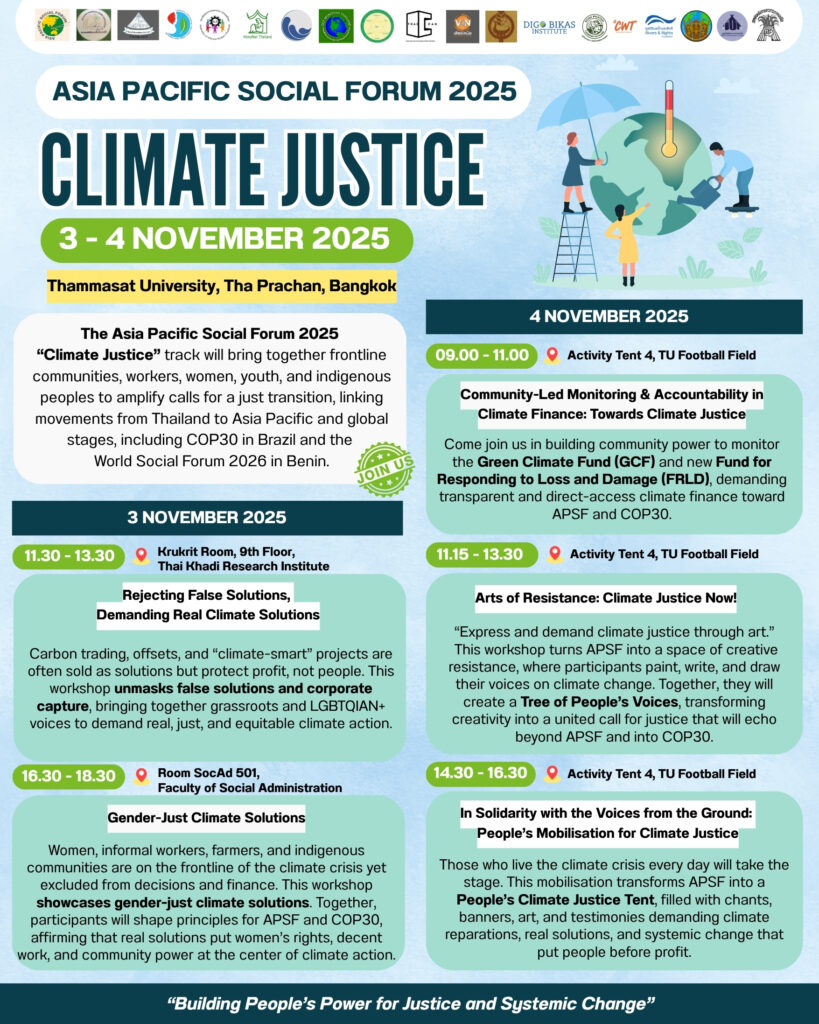
Thank you for reading along with us. We’ll keep sharing what’s ahead in the next edition!
